"Heart of Oak" is the official march of the Royal Navy. It is also the official march of several Commonwealth navies, including the Royal Canadian Navy and the Royal New Zealand Navy. It was the official march of the Royal Australian Navy, but has now been replaced by the new march, "Royal Australian Navy".

"Happy Birthday to You", or simply "Happy Birthday", is a song traditionally sung to celebrate a person's birthday. According to the 1998 Guinness World Records, it is the most recognized song in the English language, followed by "For He's a Jolly Good Fellow". The song's base lyrics have been translated into at least 18 languages. The melody of "Happy Birthday to You" comes from the song "Good Morning to All", which has traditionally been attributed to American sisters Patty and Mildred J. Hill in 1893, although the claim that the sisters composed the tune is disputed.
"Men of Harlech" or "The March of the Men of Harlech" is a song and military march which is traditionally said to describe events during the seven-year siege of Harlech Castle between 1461 and 1468, when the castle was held by the Lancastrians against the Yorkists as part of the Wars of the Roses. Commanded by Constable Dafydd ap Ieuan, son of the Baron of Hendwr, the garrison withstood the longest known siege in the history of the British Isles. The song has also been associated with the earlier, briefer siege of Harlech Castle about 1408, which pitted the forces of Owain Glyndŵr against the future Henry V of England.

"The Bonnie Blue Flag", also known as "We Are a Band of Brothers", is an 1861 marching song associated with the Confederate States of America. The words were written by the entertainer Harry McCarthy, with the melody taken from the song "The Irish Jaunting Car". The song's title refers to the unofficial first flag of the Confederacy, the Bonnie Blue Flag. The left flag on the sheet-music is the Bonnie Blue Flag.
"Sussex by the Sea" is a song written in 1907 by William Ward-Higgs, often considered to be the unofficial county anthem of Sussex. It became well known throughout Sussex and is regularly sung at celebrations throughout the county. It can be heard during many sporting events in the county, during the Sussex bonfire celebrations and it is played by marching bands and Morris dancers across Sussex. It is the adopted song of Brighton & Hove Albion Football Club, Sussex Division Royal Naval Reserve, Sussex Association of Naval Officers and Sussex County Cricket Club.
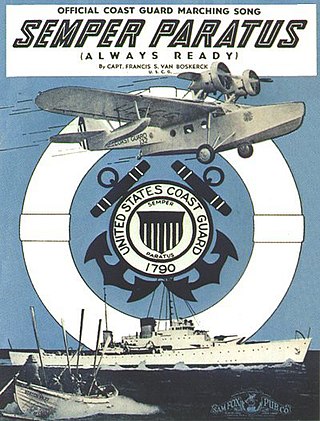
"Semper Paratus" is the official song and march of the United States Coast Guard. It was composed by U.S. Coast Guard Captain Francis Saltus Van Boskerck in 1927. It made its debut in 1928.
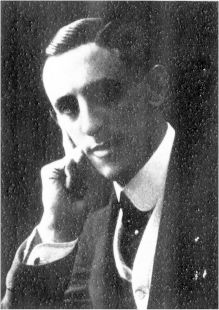
Paul Alfred Rubens was an English songwriter and librettist who wrote some of the most popular Edwardian musical comedies of the early twentieth century. He contributed to the success of dozens of musicals.

"Hail to Old OSU" is the fight song of Oregon State University. It is extracted from a song written by Harold A. Wilkins in 1914 and is played mainly at sporting events like football and basketball games. The lyrics have been slightly altered since being written "to conform to a changing culture", changing to conform to new initials, and the use of a more gender-neutral version.
"The Liberty Song" is a pre-American Revolutionary War song with lyrics by Founding Father John Dickinson. The song is set to the tune of "Heart of Oak", the anthem of the Royal Navy of the United Kingdom. The song itself was first published in two colonial newspapers, the Pennsylvania Journal and the Pennsylvania Gazette, both on July 7, 1768.
Here We Come A-wassailing, also known as Here We Come A-Christmasing,Wassail Song and by many other names, is a traditional English Christmas carol and New Year song, typically sung whilst wassailing, or singing carols, wishing good health and exchanging gifts door to door. It is listed as number 209 in the Roud Folk Song Index. Gower Wassail and Gloucestershire Wassail are similar wassailing songs.

"Come, Come, Ye Saints" is one of the best-known Latter-day Saint hymns. The lyrics were written in 1846 by Mormon poet William Clayton. The hymn has been called the anthem of the nineteenth-century Mormon pioneers and "the landmark Mormon anthem."
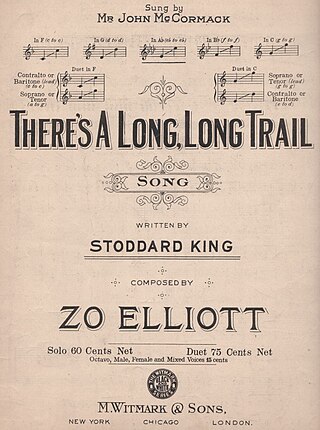
"There's a Long, Long Trail" is a popular song of World War I. The lyrics were by Stoddard King (1889–1933) and the music by Alonzo "Zo" Elliott, both seniors at Yale. It was published in London in 1914, but a December 1913 copyright for the music is claimed by Zo Elliott.

"Keep the Home-Fires Burning " is a British patriotic First World War song composed in 1914 by Ivor Novello with words by Lena Guilbert Ford.
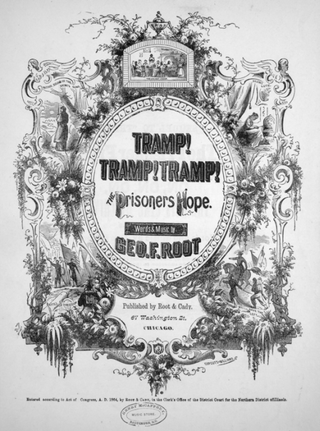
"Tramp! Tramp! Tramp! " was one of the most popular songs of the American Civil War. George F. Root wrote both the words and music and published it in 1864 to give hope to the Union prisoners of war. The song is written from the prisoner's point of view. The chorus tells his fellow prisoners that hope is coming. A Confederate version and various other versions have been made.
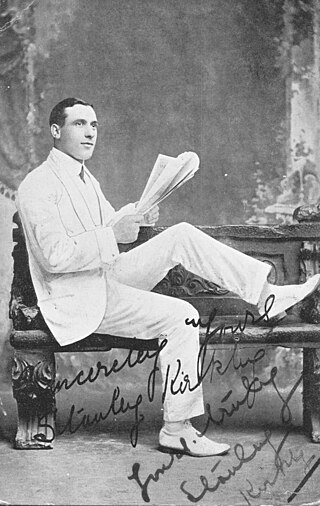
Stanley Kirkby was an English baritone singer and variety artist of the early 20th century. He sang ballads and popular songs of the Edwardian era, the First World War and the inter-War period. He sang mostly in music halls and variety theatres and was a popular recording artist.

"The Sunshine of Your Smile" is a British popular song published in London in 1913 just before the First World War by Francis, Day and Hunter. The lyrics were by Leonard Cooke and the music by Lilian Ray. It became a top ten hit on the UK Singles Chart in 1980, sung by Mike Berry.
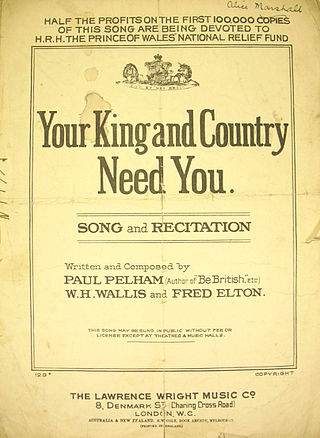
Several different recruiting songs with the name "Your King and Country Want/Need You" were popularised in Britain at the beginning of the First World War. Your King and Country Need You was a popular song and recitation, with words by Paul Pelham, and music by W. H. Wallis and Fred Elton, published in London at the start of the war in 1914 by Lawrence Wright Music. It was written as a recruiting song with the aim of persuading men to volunteer to fight in the War. Half the profits on the first 100,000 copies were to be given to the "H.R.H. Prince of Wales' National Relief Fund".

Several different recruiting songs with the name "Your King and Country Want/Need You" were popularised in Britain at the beginning of the First World War. Your King and Country Need You with words by Huntley Trevor and music by Henry E. Pether was published at the start of the war as a recruiting song with the aim of persuading men to volunteer to enlist to fight in the War.

"I Hear You Calling Me" is a British popular song published in London in 1908 by Boosey & Co. The lyrics were by Harold Lake and the music by Charles Marshall (1857-1957). The song became a signature song for the tenor John McCormack.
"When This Cruel War Is Over", also known under the title "Weeping, Sad and Lonely", is a song written by Charles Carroll Sawyer with music by Henry Tucker. Published in 1863, it was a popular war song during the American Civil War, sung by both Union and Confederate troops.














